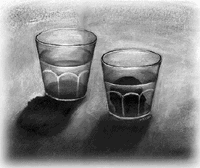
Alcohol, Depression: UB study finds gender differences
By LOIS BAKERNews Services Editor

The results were presented in Boston at the annual meeting of the Society for Epidemiologic Research.
Beth Moscato, research assistant professor in the UB Department of Social and Preventive Medicine and lead author of the study, found that for women, depression predicted subsequent alcohol problems.
Women who initially were classified as depressed were 2-1/2 times more likely to have alcohol problems after three years, than women who were not depressed, she said.
 In men, results suggested that alcohol problems appeared first, and
were somewhat more likely to lead to depression after three years.
In men, results suggested that alcohol problems appeared first, and
were somewhat more likely to lead to depression after three years.
"These findings should be a flag to health practitioners," Moscato said. "If a woman has a high level of depressive symptoms, the practitioner should also evaluate drinking problems over time. If a man has a drinking problem, he may need to be monitored for depression."
This community study was based on 986 adults who were followed for seven years.
Contributing researchers were Maria Zielezny and James R. Marshall, UB Department of Social and Preventive Medicine; Marcia Russell and Pamela Mudar, Research Institute on Addictions in Buffalo; Gladys Egri, UB Department of Psychiatry, and Evelyn Bromet, Department of Psychiatry, SUNY at Stony Brook.